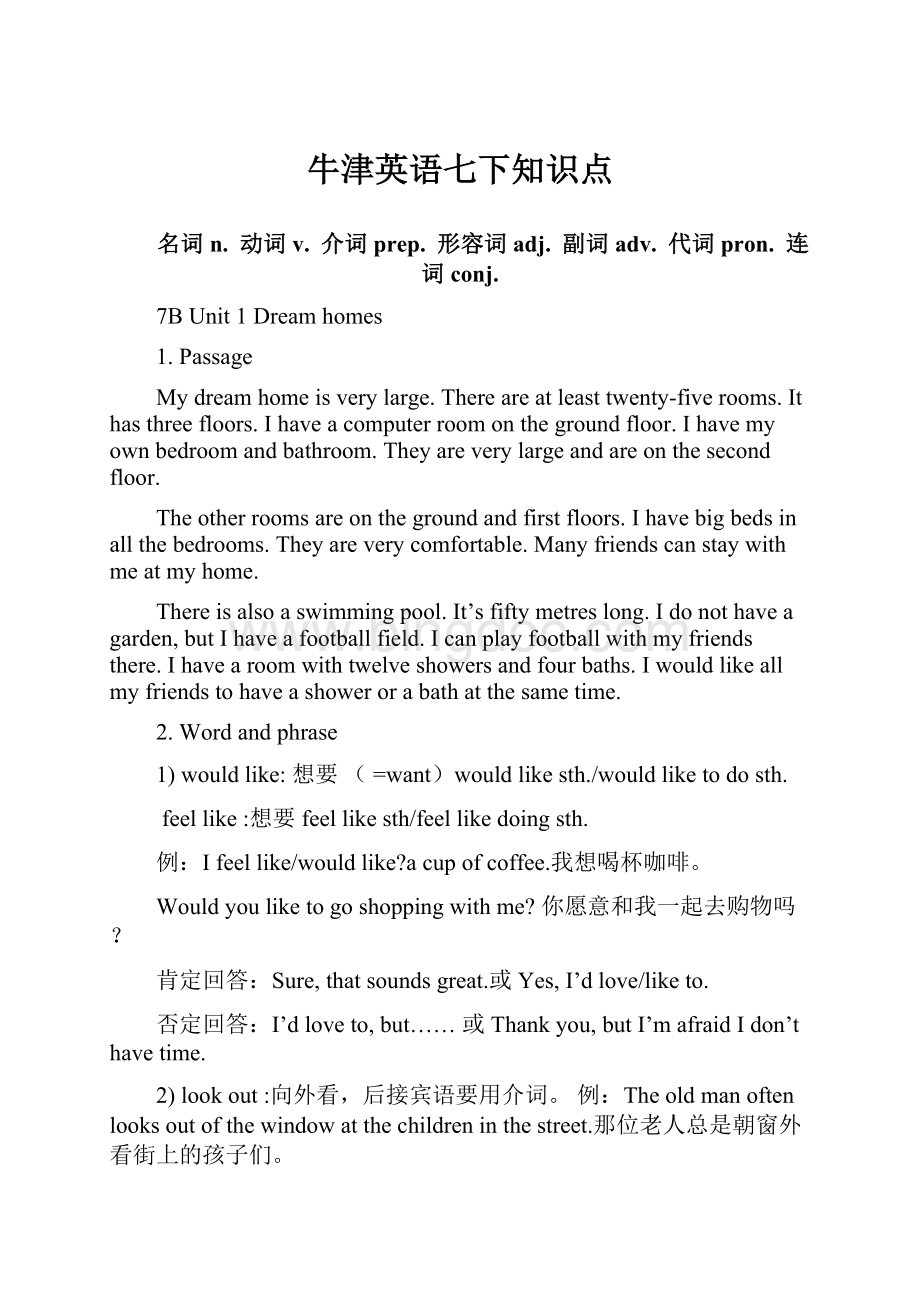牛津英语七下知识点.docx
《牛津英语七下知识点.docx》由会员分享,可在线阅读,更多相关《牛津英语七下知识点.docx(33页珍藏版)》请在冰点文库上搜索。

牛津英语七下知识点
名词n.动词v.介词prep.形容词adj.副词adv.代词pron.连词conj.
7BUnit1Dreamhomes
1.Passage
Mydreamhomeisverylarge.Thereareatleasttwenty-fiverooms.Ithasthreefloors.Ihaveacomputerroomonthegroundfloor.Ihavemyownbedroomandbathroom.Theyareverylargeandareonthesecondfloor.
Theotherroomsareonthegroundandfirstfloors.Ihavebigbedsinallthebedrooms.Theyareverycomfortable.Manyfriendscanstaywithmeatmyhome.
Thereisalsoaswimmingpool.It’sfiftymetreslong.Idonothaveagarden,butIhaveafootballfield.Icanplayfootballwithmyfriendsthere.Ihavearoomwithtwelveshowersandfourbaths.Iwouldlikeallmyfriendstohaveashowerorabathatthesametime.
2.Wordandphrase
1)wouldlike:
想要(=want)wouldlikesth./wouldliketodosth.
feellike:
想要feellikesth/feellikedoingsth.
例:
Ifeellike/wouldlike?
acupofcoffee.我想喝杯咖啡。
Wouldyouliketogoshoppingwithme?
你愿意和我一起去购物吗?
肯定回答:
Sure,thatsoundsgreat.或Yes,I’dlove/liketo.
否定回答:
I’dloveto,but……或Thankyou,butI’mafraidIdon’thavetime.
2)lookout:
向外看,后接宾语要用介词。
例:
Theoldmanoftenlooksoutofthewindowatthechildreninthestreet.那位老人总是朝窗外看街上的孩子们。
Lookout!
=Becareful!
小心,当心lookoutatthebeach:
看着外面的沙滩
3)sharesth.withsb.与某人分享某物例:
Tomsharedhisbirthdaycakewithhisfriends.
Is?
thisseat?
taken?
这个座位有人吗?
4)infrontof:
在……前面(指物体外部的前面)
Inthefrontof:
在……前部(指物体内部的前部)
例:
Thereisabigtreeinfrontofourschoolgate.我们学校门前有一棵大树
Ourteacherisstandinginthefrontoftheclassroom.我们老师正站在教室的前面
5)can’twaittodosth.迫不及待想做某事
can’tstandsth/sb./doingsth:
无法忍受某事/某人/做某事
例:
Shecan’twaittogoonholiday.她迫不及待地想去度假
Ican'tstandthecold.这么冷我受不了.Ican'tstandhimanyfurther.我对他忍无可忍。
Hecan'tstandtravelingintherushhour.他受不了在交通最繁忙时出游
。
6)onthe+序数词+floor:
在第几层楼Theflatisontheseventhfloor.
在英国,人们通常将一楼称为groundfloor,而将二楼称为firstfloor,三楼称为secondfloor,但在美国,人们通常将一楼直接称为firstfloor,二楼称为secondfloor,三楼称为thirdfloor
7)livewith:
和某人住在一起
例:
Ilivewithmyfamilyinawoodenhouse.我和我家人住在一座木屋里。
8)getinto:
进入getto=reach=arrivein/at:
到达
例:
Iclimbaladdertogetintomyhouse.我爬梯子进入我家。
Whenwillyougetto/reachBeijing?
你什么时候到达北京?
9)Thesecondchild:
第二个孩子
例:
I’mthesecondchildofmyfamily.我是我们家第二个孩子
10)inthecentreof:
在……中心IliveinthecentreofAKS.我住在阿克苏的中心
3.Grammar
●数词
1)
基数词
1=one
2=two
3=three
4=four
5=five
8=eight
序数词
1st=first
2nd=second
3rd=third
4th=fourth
5th=fifth
8th=eighth
基数词
9=nine
12=twelve
13=thirteen
20=twenty
21=twenty-one
30=thirty
序数词
9th=ninth
12th=twelfth
13th=thirteenth
20th=twentieth
21st=twenty-first
30th=thirtieth
2)数字的读法
在英式英语中,一个数的最后两位(百位和十位/十位和个位)得用“and'’,但美式英语中则不用。
如:
3,077读作:
E:
threethousandandseventy—seven
U.S:
threethousandseventy—seven.
202读作:
twohundred(and)two
234读作:
twohundred(and)thirty-four
1,234读作:
onethousandtwohundred(and)thirty-four
11,234读作:
eleventhousandtwohundred(and),thirty—four
155,721读作:
onehundred(and)fifty-fivethousandsevenhundred(and)twenty-one
6,155,702读作:
sixmilliononehundred(and)fifty-fivethousandsevenhundredandtwo
26,000,008读作:
twenty-sixmillionandeight
326,414,718读作:
threehundred(and)twenty-sixmillion,fourhundred(and)fourteen
thousand,sevenhundred(and)eighteen
twothousand,threehundred……hundred/thousand…不用加-s
3)分数小数和百分比
A.分数:
分子用基数词表示,分母用序数词表示。
先读分子,后读分母。
当分子大于1时,分母要加“s”。
例如
1/2读作:
a/onehalf(口语中更倾向于用“a”代替“one”)
1/3读作:
a/onethird
1/8读作:
an/oneeighth
1/4读作:
a/onequarter(fourth)
2/3读作:
twothirds
B.小数:
小数点“.”读“point”
93,64m读作:
ninety-threepointsixfourmeters
C.百分比“percent"
25%读作twenty-fivepercent
11.3%读作elevenpointthreepercent
(4)年代及日期的读法
数字表示的年份通常分成两半来说。
2000B.C.读作:
twothousandBC
1558读作:
fifteenfifty-eight
921读作:
ninetwenty-one
日期的表达英式和美式有所不同,请注意区别。
在日期的写法上,英式先写日子,美式先写月份。
英1999年4月6日=6thAprill999
美1999年4月6日=April6,1999
在读法上,英国人有两种表达方式:
1.Aprilthesixth,nineteenninety-nine
2.ThesixthofApril,nineteenninety-nine
美国人则一般这样表示:
Aprilsixth,nineteenninety-nine(省略“the")
(5)钟点的读法
7:
00seveno’clocka.m./p.m.
8:
15aquarterpasteight/eightfifteen
9:
30halfpastnine/ninethirty
9:
45aquartertoten/nineforty-five
10:
03three(minutes)pastten/tenohthree
(6)电话号码、温度与门牌号的读法
A.电话号码
345—6638读作:
threefourfive,doublesixthreeeight
307—4922读作:
threeoseven,fourninedoubletwo
B.温度
表示温度有华氏(Fahrenheit)和摄氏(Centigrade)两种。
英美均使用华氏作为温度的计量单位。
摄氏用法现已日渐普及。
15℃读作:
fifteendegreesCentigrade
-5C读作:
fivedegreesbelowzero
C.门牌号.
门牌号遇三位数分别读出各数字,遇四位数时则分成两半来读。
例如:
Room302读作:
RoomthreeOftwo/threezerotwo
3491KingStreet读作:
thirty-fourninety-oneKingStred
●介词
1)before时空在之前,after之后off远。
直上over,above斜,under,below下相反。
直到till,on表面,穿过through,for因缘。
by表旁边in里面,with伴随by车船。
时间地点at、in、on,二者between多among,
behind后面beside旁,附近near沿着along。
from来自like像,表示目的for,to到。
of所属周围round,向上up向下down。
beyond超出、无、不能,against靠着,对与反。
besides,except分内外,among之内along沿。
同类比较except,加for异类记心间。
原状becauseof,、owingto、dueto表语形容词
under后接修、建中,of、from物、化分。
before、after表一点,ago、later表一段。
before能接完成时,ago过去极有限。
since以来during间,since时态多变换。
2)infrontof:
在……前面(指物体外部的前面)
Inthefrontof:
在……前部(指物体内部的前部)
Thewindowisoppositethedoor.opposite相对,相反
beside/nextto邻近,旁边;near附近
inside/outside;
across:
横穿,从表面穿过;through:
纵穿,从中间穿过
3)In+段时间:
表将来;after+时间点表将来
例;IwillgotoBeijinginthreedays.我三天后去北京。
IwillgotoBeijingafterWednesday.
4)时间地点at、in、on
at
小时间
几点钟时
Thefilmstartsatsixo’clock..
三餐
Ireadthenewspaperatbreakfast.
节日
PeoplegivepresentsatChristmas.
年龄
ChildreninChinagotoschoolat7.
on
具体时间
星期几
WestartschoolonMonday.
日期
Theholidaystartson2ndJuly.
被修饰的时间
WehaveapartyontheeveningofJanuary1st.
Thelittlematchgirldiedonacoldmorning.
in
大时间
早中晚(atnoon/night)
Thepartyisintheevening/morning/afternoon.
月份
ChristmasisinDecember.
季节
InthenorthofChina,it’sverycoldinwinter.
年
Mycousinwasbornin1990.
7BUnit2WelcometoSunshineTown
1.Passage
1)SunshineTownisanewtowninBeijing,thecapitalofChina.It’sonly40minutesfromthecentreofBeijingbyunderground.ThereislessairpollutioninSunshineTownthaninotherareasofBeijing.Thereisacountrypark.Thecountryparkisbeautiful.It’snameisSunshinePark.Youcangowalkingthere.Youcanseegreenhills,treesandlakestoo.
2)EatChinesefood?
Ifso,youarehereintherightplace!
HowmanyrestaurantsarethereinSunshineTown?
It’shardtosay.YoucanchooseanyfoodyoulikeinSunshineTown.YoucantryBeijingDuckinoneoftheChineserestaurantsinStarShoppingMall.HowmuchBeijingDuckcanyoueat?
Ifyoudon’tlikeChinesefood,TherearelotsofWesternrestaurantstoo.
2.Wordandphrase
1)havetodosth.必须/不得不做某事(客观)must:
必须(主观)
don’t/doesn’thavetodosth.=needn’tdosth.不必做某事
例:
Shehastogetupat9o’clockeverymorning.她不得不在每天早上9点钟起床。
Youdon’thavetowalksofast.=Youneedn’twalksofast.你没必要走这么快。
Wemuststopnow.我们必须现在停止。
注:
以must开头的疑问句,肯定回答用must,否定回答常用needn’t.
问:
MustIfinishtheworktoday?
我必须今天完成这项工作吗?
答:
Yes,youmust.是的,你必须。
No,youneedn’t.不,你不必。
2)order:
订购/点(酒,菜等)
例:
I’dliketoorderafish,please.我想点条鱼Maybewecanorderapizza.也许我们能订个比萨饼。
3)until:
用语肯定句中,意为“直到……为止”;用于否定句中,意为“直到……才”
例:
Hesleepsuntilseveno’clockeveryday.他每天一直睡到7点钟。
Hedoesn’twakeupuntilseveno’clockeveryday.他每天直到7点钟才醒。
4)else:
另外,其他,常用语疑问词或不定代词之后。
例:
Whatelsedoyouwanttobuy?
其它我们还需要买什么?
Doyouwantanythingelse?
你还想要其它东西吗?
5)showsb.around带某人参观(某处)
例:
I’mgoingtoshowyouaroundmyhometown..我准备带你参观一下我的家乡。
5)常见的复合不定代词
everyone人人anyone任何人everybody每人anybody任何人anything任何事everything每件事
someone某人noone没人somebody某人nobody没有人something某事nothing没有东西
注:
复合不定代词做主语,谓语动词用单数。
形容词或else修饰复合不定代词要放在复合不定代词后面
例:
Everyoneishere.大家到齐了Somethingiswrongwithmycar.我的车子出了点毛病
Ihavesomethingimportanttotallyou.我有一些重要的事情要告诉你。
Canyoufindanyoneelse?
你能再找一个人吗?
6)forexample:
Forexample,IamfromChina.
7)becloseto靠近,接近Weliketoliveintallbuildingsbecausewecanbeclosetoourfriends.
8)intherightplace在适当的位置/在规定的地点例:
Puttheluggageintherightplace.把行李安置好
9)belongto:
属于……例;Thisbookbelongstome.这本书是我的
3.Grammar
冠词(a/an/the)
冠词用法口诀:
名词是秃子,常要戴帽子。
可数名词单,须用a或an;辅音前用a,元音前用an。
若为特指时,则须用定冠。
复数不可数,泛指冠不现;碰到代词时,冠词均不现。
mydog,mycat
例子
1)a/an+可数名词单(泛指)
adog,acat,aunit;anapple,anuniversity,anhour
2)the+单数可数名词/复数可数名词/不可数名词(特指)
thebook(特指);thebooks(特指);thebread(特指)
3)不用冠词+复数可数名词/不可数名词(泛指)
books(泛指);bread(泛指)
●用定冠词的情况:
●特指双熟悉,上文已提及,世上独一无二,序数最高级,富人伤员按天算,方位乐器影剧院。
普专复数姓氏前theGreens,习语及乐器。
[注]
(1)the用在“特指”谈话双方都知道的某个人或某些人或物前。
如:
Whereistheteacher?
老师在哪里?
(2)the用在上文已提到的人或事物前。
如:
Icanseeacat.ThecatisLucy’s.我能看见一只猫,那只猫是露茜的。
(3)the用在世界上独一无二的事物前。
如:
Theearthgoesaroundthesun.地球围绕着太阳转。
(4)the用在序数词或形容词最高级前。
如:
Mikeisthetallestofthethreeboys.迈克是三个男孩中最高的一个。
(5)the用在由普通名词构成的专有名词前。
如:
theGreatWall(长城),thePeople’sPark(人民公园)等。
(6)富人伤员按天算,方位乐器影剧院。
(therich,thewounded;bytheday;intheeast;playthepiano;thetheatre)
(7)击中脸,胳膊….Hehitmeontheface.
(8)the用在一些习惯用语中或乐器名词前。
playthepiano(弹钢琴),intheday(在白天),inthedaytime(在白天);inthemorning/afternoon/evening;intheend(最后);
allthetime(一直);atthesametime(同时);attheageof(在….岁时);atthebeginningof(在…开始时);atthemoment(立刻)
bytheway(顺便说一下);intheopenair(在户外);ontheothersideof(在…的另一边);ontheotherhand(在另一方面)
inthemiddleof(在…中间)
●不用冠词的情况:
代词限定名词前,专有名词不可数,复数名词表泛指,学科球类三餐饭,季节星期月份前,颜色语种和国名,
称呼习语及头衔。
[注]
(1)名词前已有作定语用的this,that,these,those,my,your,his,her,our,their,some等限定词时,不用冠词。
如:
thiseraser,herp